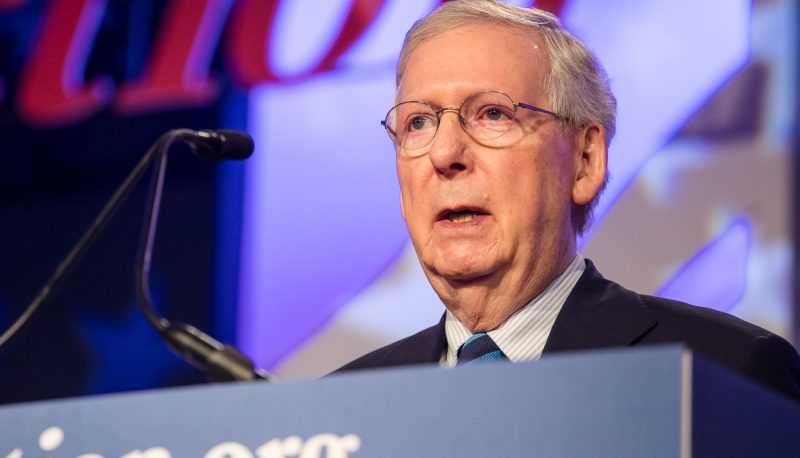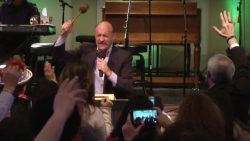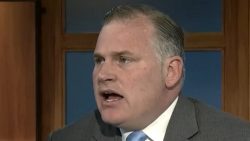“Anti-Catholic bigotry has no place in the United States of America,” President Donald Trump said two weeks ago in a hyperpartisan video message to the charitable Alfred E. Smith Memorial Foundation, claiming in the next breath that such bigotry “predominates in the Democrat Party.” It’s a preposterous claim, considering that the two top figures in the Democratic Party—presidential nominee Joe Biden and House Speaker Nancy Pelosi—are practicing Catholics.
That kind of divisive smear is sadly not surprising coming from Trump; as the editors of the lay Catholic magazine Commonweal editorialized recently, “What sets Trump apart, and makes this election so urgently important, is the viciousness of the man himself: his malice and well-documented mendacity, his callousness and incompetence, his total lack of scruples.”
‘Anti-Catholic’ Smears as Political Tactic
Even before Trump went along with demands from his religious-right supporters that he nominate Amy Coney Barrett to the Supreme Court, right-wing groups were dusting off the dishonest “anti-Catholic” playbook that they have turned to again and again—accusing Democratic senators who raise questions about judicial nominees’ judicial philosophy of being anti-religious, and often specifically anti-Catholic.
The smears came from the top—in this case, Senate Majority Leader Mitch McConnell, who claimed on Oct. 7, “United States Senators are suggesting that Judge Barrett is too Christian, or the wrong kind of Christian, to be a good judge.” That charge was repeated by Carrie Severino, whose Judicial Crisis Network has spent many millions of dollars to make right-wing ideology dominant in the federal courts. She tweeted that McConnell was “exactly right,” adding, “The Democrats and their liberal allies think Judge Barrett is ‘too Christian’ or ‘the wrong kind of Christian’ to be a good judge. That is rank bigotry, and it has no place in our country.”
The “anti-Catholic” smear against Democratic senators—even Catholic senators—by religious-right and Republican leaders has a long and dishonorable history as a tactic for deflecting criticism from the records and extremist ideologies of some judicial nominees.
During the first two days of Barrett’s confirmation hearings, the only people talking about Barrett’s faith have been Republicans. Democratic senators have asked substantive questions about Barrett’s opposition to the Affordable Care Act, her open hostility to Roe v. Wade and legal abortion, her criticism of the Supreme Court’s marriage equality ruling, her record as a judge on racial discrimination cases—and even the imperative for a peaceful transfer of power.
But Barrett’s backers have kept up a constant drumbeat on the “anti-Catholic” front, promoting a false narrative that opposition to her confirmation is grounded in religious bigotry. Vice President Mike Pence, for example, recently appeared at an event sponsored by the anti-LGBTQ Family Leader Foundation in Iowa, where he railed against Democrats and “Hollywood elites,” saying, “[T]hese attacks on Judge Barrett’s faith must stop!”
Meanwhile, Barrett’s supporters routinely cite her “devout” Catholicism as a selling point; some dominionist Pentecostal leaders even say that Barrett, a Charismatic Catholic, has been “anointed” by God to bring an end to abortion in America. (Charismatic worship practices, which emphasize “gifts of the Holy Spirit” like speaking in tongues, are mostly associated with the Pentecostal branch of evangelical Protestantism but have been embraced by communities within other Christian denominations.)
‘Anti-Catholic’ Smears as Electoral Strategy
Trump’s rhetoric and that of his allies seems designed not only to suppress objections to Barrett’s confirmation but also to use the charge of Democratic anti-Catholicism to benefit his reelection prospects. In his video for the Al Smith dinner, Trump followed his false claim of anti-Catholic bigotry among Democrats with a directive: “[W]e must do something immediately about it, like a Republican win.”
Some right-wing Catholic pundits and members of the hierarchy, like Bishop Joseph Strickland and Rev. James Altman, a Wisconsin priest, are promoting Trump’s reelection by claiming, “You cannot be Catholic and be a Democrat.” Such partisan smears disrespect the long and robust tradition of Catholic social teaching and social justice activism among Democratic activists, including those who make up Catholics for Biden.
In Biden’s video address to the Al Smith dinner, he talked about the impact of social justice teachings on his life and said his Catholic faith has helped him through dark times to find “purpose to live a life worthy of those I lost.”
Anti-Catholicism Close to Home
As for Trump, during the 2016 Republican primaries, when he was competing with Sen. Ted Cruz—the son of a Cuban evangelical minister—for the support of conservative evangelicals in Iowa, Trump wondered in front of an audience whether Cuba raises “true evangelicals,” suggesting that Cruz’s Cuban family background meant that Cruz could be secretly Catholic and insinuating that that would make him less worthy of their support.
Trump and many of his backers have had extremely harsh words for Pope Francis, leader of the Catholic Church. When the pope criticized Trump’s immigration policies and described his desire for a wall along the U.S.-Mexican border as “not Christian,” Trump fired back, saying it was “disgraceful” for the pope to question his faith—even though Trump, of course, has repeatedly questioned the faith of his political opponents. A few months ago, Trump embraced Carlo Maria Viganò, a hard-right fringe anti-Francis archbishop who portrayed Trump’s battle against the “deep state” as a “biblical” battle of light against darkness.
Attacks on the pope and on Catholicism itself—and other forms of religious bigotry—are not hard to find within religious-right and right-wing circles that make up Trump’s most loyal political base.
Members of Trump’s Cabinet have participated in weekly Bible studies with Ralph Drollinger, who teaches public officials that the Bible mandates their support for a range of right-wing policies. Drollinger has called Catholicism “one of the primary false religions in the world.” But that hasn’t kept him from getting privileged access to teach members of the House, Senate, and Cabinet. And it hasn’t kept Pence and Secretary of State Mike Pompeo from opening doors for Drollinger to take his Bible studies behind closed doors to powerful politicians in foreign capitals.
Robert Jeffress, pastor of First Baptist Church in Dallas, Texas, and a relentless promoter of Trump from the pulpit and via frequent appearances on Fox, was denounced by news website IrishCentral earlier this year as “a bigoted anti-Catholic who believes the Catholic Church was created by Satan.” In the past, Jeffress has enlisted Fox pundit Sean Hannity, who recently left the Catholic Church, and other friends on Fox to back up his denials of anti-Catholic bias, claiming such charges against him were based on quotes from him that had been “manufactured” or taken out of context. A few years ago, the Dallas Observer transcribed portions of Jeffress comments that had been highlighted by Right Wing Watch in 2011 in which Jeffress reports that the early church was “infected” by a “Babylonian mystery religion” that that “today the Roman Catholic Church is the result of that corruption.” Jeffress said then:
Much of what you see in the Catholic Church today doesn’t come from God’s word; it comes from that cultlike, pagan religion. Now you say, ‘Pastor, how can you say such a thing? That is such an indictment of the Catholic Church. After all, the Catholic Church talks about God and the Bible and Jesus and the blood of Christ and salvation.’
Isn’t that the genius of Satan? If you want to counterfeit a dollar bill, you don’t do it with purple paper and red ink. You’re not going to fool anybody with that. But if you want to counterfeit money, what you do is make it look closely related to the real thing as possible.
And that’s what Satan does with counterfeit religion. He uses, he steals, he appropriates all of the symbols of true biblical Christianity, and he changes it just enough in order to cause people to miss eternal life.
When Mitt Romney was running for the Republican presidential nomination, Jeffress denounced the Mormon Church as a cult, and he reportedly used the word to characterize the Catholic Church when speaking with journalists later to defend those comments. “I believe we should always support a Christian over a non-Christian,” Jeffress said, adding, “Christians are uniquely favored by God, [while] Mormons, Hindus and Muslims worship a false god. The eternal consequences outweigh political ones. It is worse to legitimize a faith that would lead people to separation from God.” (Jeffress changed his tune in 2012 when Romney became the Republican nominee, saying it was better for evangelicals to support Romney given Obama’s positions on legal abortion and marriage equality.)
By their own standards, there’s no shortage of hard-right pundits who appear to exhibit “anti-Catholic bigotry” in their criticism of the pope, the head of the Roman Catholic Church. Birtherism-promoting WorldNetDaily suggested that the pope’s criticism of the excesses of capitalism was shaped by the KGB. Pamela Geller, an anti-Muslim activist and zealous Trump supporter, mocked and criticized Francis over a papal letter calling for “affection and respect” toward Muslims, asking, “When did he become an imam?” The American Family Association’s Bryan Fischer has slammed Pope Francis for not taking a more strident stance against homosexuality—saying the pope is “taking his theological cues from popular culture rather than the Word of God”—and climate change—“Pope Francis takes the Church back to the anti-science days of Galileo.”
Politics Trumps Theology
In spite of theological differences, conservative evangelicals have long made common political cause with conservative Catholics in fighting culture-war battles around abortion, LGBTQ equality, and public funding for religious schools, making a legal and public relations strategy of framing those issues as questions of religious liberty. Right-wing evangelicals have welcomed the intellectual and political leadership of right-wing Catholics like Attorney General William Barr, Princeton’s anti-LGBTQ Robert George, the Federalist Society’s Leonard Leo, the Heritage Foundation’s Ryan Anderson, and the most right-wing Supreme Court justices.
In 2016, Trump-promoting dominionist Lou Engle welcomed Catholics to The Call’s ”Azusa Now“ prayer gathering and highlighted the Catholic charismatic movement, even though his New Apostolic Reformation colleagues like Cindy Jacobs have in the past denounced Catholicism as a form of “religious occultism” and encouraged believers to burn photos and icons of the Virgin Mary and other Catholic saints as demonic objects.
Harry Jackson, an anti-LGBTQ pastor and POTUS Shield member, supported Catholic Supreme Court nominees like John Roberts and Samuel Alito, but in 2010, when President Barack Obama nominated Elena Kagan, who is Jewish, Jackson declared that the nomination “should outrage evangelical Protestants.” Jackson argued, “Although Catholics are well represented on the Supreme Court, there will likely be important cases that will need the insight of unbiased evangelicals to create an atmosphere for true justice.” In the case of Amy Coney Barrett, Jackson has expressed no similar concerns about the lack of evangelical representation on the high court; indeed, Jackson, a cancer survivor, was among the non-mask-wearing celebrants at the White House announcement of Barrett’s nomination that is now understood to have been a superspreader event for COVID-19.
Today, as in 2016, conservative evangelicals and conservative Catholics see Trump and his Republican allies the vehicle for achieving their joint political agenda: creating a federal judiciary dominated by right-wing judges, undermining separation of church and state and promoting Christian nationalism, criminalizing abortion, reversing legal and cultural gains made by women and LGBTQ people, and dramatically limiting the authority of the federal government.
Opposition to Barrett’s Judicial Philosophy
Progressive opposition to the confirmation of Judge Amy Coney Barrett as a Supreme Court justice is grounded in opposition to that agenda and the concern that millions of people’s lives and families will be harmed by it, beginning with those who could be stripped of access to health care if Barrett votes with other right-wing justices to overturn the Affordable Care Act, which she has made clear in writing that she considers unconstitutional.
That explains why Sister Simone Campbell, executive director of NETWORK Lobby for Catholic Social Justice, has opposed Barrett’s confirmation, citing Barrett’s opposition to the ACA and her voting “to uphold the wrongful conviction of a man based on faulty evidence.” In a press statement, Campbell stated:
It is insulting to act as if my faith boils down to one issue. Catholics cannot support judges or politicians who blatantly ignore the breadth of Catholic Social Teaching on women’s rights, voting rights, immigrant’s rights, health care, environmental protections, and so much more.
This crass partisan power grab by the President, Senator McConnell, and his Republican colleagues is an insult to our democracy. It is an assault on our democratic system to rush a vote while they cling to power. The people and their next chosen President must decide on the next Supreme Court Justice. If Senator McConnell and President Trump think that pushing this through will help them win Catholic votes, then they don’t know Catholics. Unlike these politicians focused on taking power at all costs, we love our country more than political power. We Catholics will vote for integrity, justice, and the common good.
The U.S. Constitution’s prohibition on a religious test for public office protects religious liberty. Opposition to confirming judges with harmful judicial ideologies is not a religious test. In American public life, Christian nationalists and religious-right activists have a record of challenging political opponents’ faith and arguing that candidates’ religious beliefs make them unfit to hold public office.
Republicans and right-wing judicial advocates have spent decades building a political movement with the power to create lasting ideological domination of the federal courts. And they have spent years trying to discredit opposition to their power play by portraying opposition to right-wing judicial nominees as religious bigotry.
The difference between Republican claims about Democratic opposition to the confirmation of Barrett and what Democratic senators are actually saying is stark. Republicans should be held accountable for their dishonest smears.









